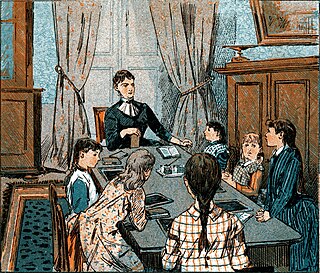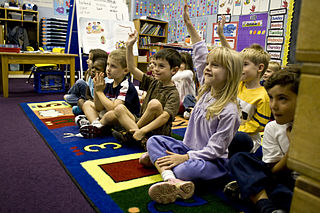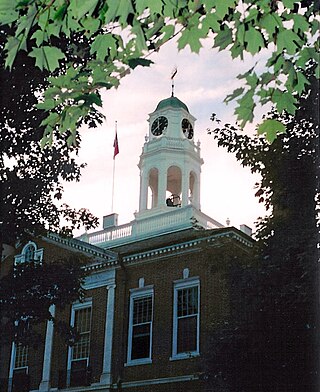
Homeschooling or home schooling, also known as home education or elective home education (EHE), is the education of school-aged children at home or a variety of places other than a school. Usually conducted by a parent, tutor, or online teacher, many homeschool families use less formal, more personalized and individualized methods of learning that are not always found in schools. The actual practice of homeschooling varies considerably. The spectrum ranges from highly structured forms based on traditional school lessons to more open, free forms such as unschooling, which is a lesson- and curriculum-free implementation of homeschooling. Some families who initially attended a school go through a deschool phase to break away from school habits and prepare for homeschooling. While "homeschooling" is the term commonly used in North America, "home education" is primarily used in Europe and many Commonwealth countries. Homeschooling should not be confused with distance education, which generally refers to the arrangement where the student is educated by and conforms to the requirements of an online school, rather than being educated independently and unrestrictedly by their parents or by themselves.
The Christian right, otherwise referred to as the religious right, are Christian political factions characterized by their strong support of socially conservative and traditionalist policies. Christian conservatives seek to influence politics and public policy with their interpretation of the teachings of Christianity.
In secular usage, religious education is the teaching of a particular religion and its varied aspects: its beliefs, doctrines, rituals, customs, rites, and personal roles. In Western and secular culture, religious education implies a type of education which is largely separate from academia, and which (generally) regards religious belief as a fundamental tenet and operating modality, as well as a prerequisite for attendance.

Kindergarten is a preschool educational approach based on playing, singing, practical activities such as drawing, and social interaction as part of the transition from home to school. Such institutions were originally made in the late 18th century in Germany, Bavaria and Alsace to serve children whose parents both worked outside home. The term was coined by German pedagogue Friedrich Fröbel, whose approach globally influenced early-years education. Today, the term is used in many countries to describe a variety of educational institutions and learning spaces for children ranging from two to six years of age, based on a variety of teaching methods.

Concerned Women for America (CWA) is a socially conservative, evangelical Christian non-profit women's legislative action committee in the United States. Headquartered in Washington D.C., the CWA is involved in social and political movements, through which it aims to incorporate Christian ideology. The group was founded in San Diego, California in 1978 by Beverly LaHaye, whose husband Timothy LaHaye was an evangelical Christian minister and author of The Battle for the Mind, as well as coauthor of the Left Behind series.
The education system in Northern Ireland differs from elsewhere in the United Kingdom, but is similar to the Republic of Ireland in sharing in the development of the national school system and serving a similar society with a relatively rural population. A child's age on 1 July determines the point of entry into the relevant stage of education in the region, whereas the relevant date in England and Wales is 1 September.

Secondary education is the last six or seven years of statutory formal education in the United States. It culminates with twelfth grade. Whether it begins with sixth grade or seventh grade varies by state and sometimes by school district.

A parent–teacher association/organization (PTA/PTO), parent–teacher–friend association (PTFA), or parent–teacher–student association (PTSA) is a formal organization comprising parents, teachers and staff that is intended to facilitate parental participation in a school.

A state school, public school, or government school is a primary or secondary school that educates all students without charge. They are funded in whole or in part by taxation and operated by the government of the state. State-funded schools are global with each country showcasing distinct structures and curricula. Government-funded education spans from primary to secondary levels, covering ages 4 to 18. Alternatives to this system include homeschooling, private schools, charter schools, and other educational options

A Christian school is a religious school run on Christian principles or by a Christian organization.

A private school is a school not administered or funded by the government, unlike a public school. Private schools, are schools that are not dependent upon national or local government to finance their financial endowment. Unless privately owned they typically have a board of governors and have a system of governance that ensures their independent operation.

A Sunday school, sometimes known as a Sabbath school, is an educational institution, usually Christian in character and intended for children or neophytes.
Education in Denmark is compulsory for children below the age of 15 or 16, even though it is not compulsory to attend Folkeskole. The school years up to the age of fifteen/sixteen are known as Folkeskole, since any education has to match the level offered there. About 82% of young people take further education in addition to this. Government-funded education is usually free of charge and open to all. Denmark has a tradition of private schools and about 15.6% of all children at basic school level attend private schools, which are supported by a voucher system.
Integrated education in Northern Ireland refers to the bringing together of children, parents and teachers from both Roman Catholic and Protestant traditions in childhood education: the aim being to provide a balanced education, while allowing the opportunity to understand and respect all cultural and religious backgrounds.
A pre-school playgroup, or in everyday usage just a playgroup, is an organised group providing care and socialisation for children under five. The term is widely used in the United Kingdom. Playgroups are the same as preschool education and nursery schools. They can provide full-time care, or operate for only a few hours a day during school term time or all year round. The business model of a playgroup has changed over time and they are now very similar to pre-schools, nurseries and schools. They are staffed by nursery nurses, nursery teachers or qualified nursery practitioners, and are run by private individuals or charities, rather than by the state or companies.
A voluntary controlled school is a state-funded school in England and Wales in which a foundation or trust has some formal influence in the running of the school. Such schools have less autonomy than voluntary aided schools, in which the foundation pays part of any building costs.

Waldorf education, also known as Steiner education, is based on the educational philosophy of Rudolf Steiner, the founder of anthroposophy. Its educational style is holistic, intended to develop pupils' intellectual, artistic, and practical skills, with a focus on imagination and creativity. Individual teachers have a great deal of autonomy in curriculum content, teaching methods, and governance. Qualitative assessments of student work are integrated into the daily life of the classroom, with standardized testing limited to what is required to enter post-secondary education.

Accelerated Christian Education is an American company which produces the Accelerated Christian Education school curriculum structured around a literal interpretation of the Bible and which teaches other academic subjects from a Protestant fundamentalist or conservative evangelical standpoint. Founded in 1970 by Donald Ray Howard and Esther Hilte Howard, ACE's website states it is used in over 6,000 schools in 145 countries.

Rehoboth Christian College is a dual-campus independent trans-denominational Protestant co-educational primary and secondary day school, located in the south-eastern corridor of Perth, Western Australia. The college comprises a Year K to Year 6 campus in the suburb of Wilson, and a Year K to Year 12 campus in the suburb of Kenwick. The college currently enrols some 1000 students across its two campuses.
A voluntary aided school is a state-funded school in England and Wales in which a foundation or trust contributes to building costs and has a substantial influence in the running of the school. In most cases the foundation or trust owns the buildings.











